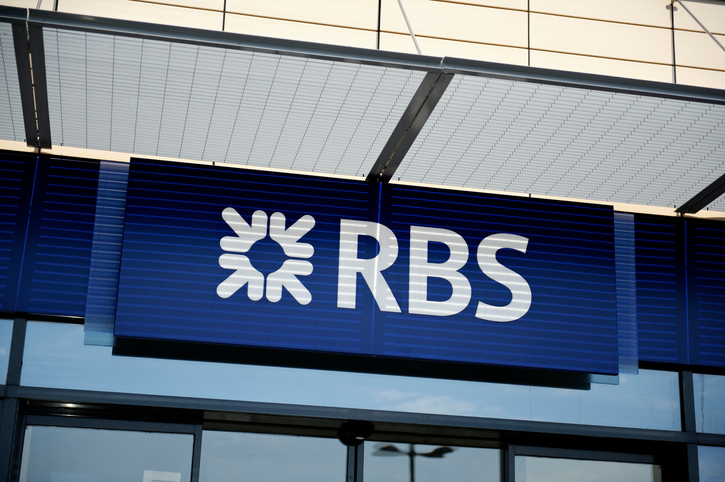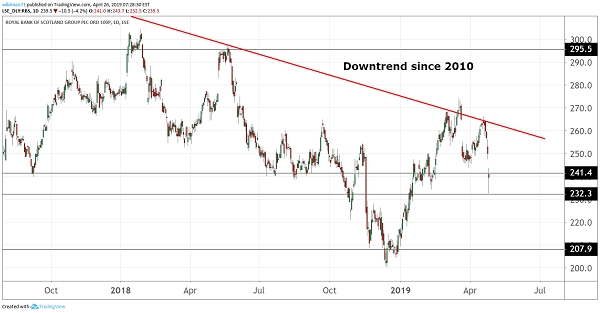Royal Bank of Scotland undone by Brexit
These were a 'noisy' set of Q1 results from RBS, but probably look 'worse than the reality'.
26th April 2019 13:33
by Graeme Evans from interactive investor
These were a 'noisy' set of Q1 results from RBS, but probably look 'worse than the reality'.

Back in the dividend-paying ranks and with shares up by as much as 25% in 2019, The Royal Bank of Scotland (LSE:RBS) provided investors with a reality check today as the state-backed lender warned its recent progress could be hampered by near-term challenges around Brexit.
The disappointing set of first quarter results unnerved the City, particularly after yesterday's announcement that respected CEO Ross McEwan is to go after more than five years in charge. Shares fell 5% as analysts scaled back their earnings forecasts, although today's guidance is unlikely to undo the recent momentum of RBS now being seen as a "buy".
Shore Capital reiterated its price target of 300p, while UBS remains at 290p as one of its three buy recommendations in UK banking — the others being Lloyds Banking Group (LSE:LLOY) and Barclays (LSE:BARC).
Much will now depend on an end to Brexit uncertainty, which RBS said today was leading to business borrowing decisions being delayed and had made income growth “more challenging in the near term”. Bank margins also remain constrained, with future interest rate rises dependent on any Brexit deal.

Source: TradingView Past performance is not a guide to future performance
Across its retail and commercial businesses, RBS said its net interest margin of 2.07% held steady on the previous quarter. It continues to support customers throughout the uncertainty, with strong mortgage growth in particular driving a £1.7 billion increase in net UK loans.
Overall, underlying profits were 9% below the market consensus, with net interest income some 6% below market forecasts and costs 1% weaker. However, UBS analyst Jason Napier said the figures were "noisy" and impacted by accounting changes, meaning that the headline results "probably look worse than the reality".
The previous financial year had been a landmark one for the bank, with a bottom-line profit and the first dividend payments in ten years including the extra carrot of a 7.5p special dividend.
According to RBS-compiled consensus figures, the market expects ordinary and special dividends amounting to 15p a share this year, alongside share buy-backs totalling £1.4 billion.
This rises to 17p a share and £1.5 billion in 2020, as RBS reduces its common equity tier one ratio to a more normal 14.6% in order to be able to release capital.
- Royal Bank of Scotland now an income play
- Barclays rallies as shareholders promised more
The buy-backs are likely to include the targeted purchase of the government's current 62.2% stake, the presence of which continues to weigh on the share price performance. While the stock has performed well this year, it has so far been unable to revisit the 300p level last seen in 2015.
One of the key goals for RBS in 2019 will be to cut costs by another £300 million, which the bank said it was on track to achieve after a £45 million reduction in the first quarter. Longer term, it wants a cost/income ratio of under 50%, although the current figure remains stubbornly high after increasing to 63.4% from 60.5% in the previous quarter.
Other targets for 2019 include a better customer experience and a £1 billion outlay on upgrading legacy infrastructure, improving systems and processes and delivering innovation.
UBS's Napier sees little change in this strategy or in the targets under a new CEO. The current head of RBS's commercial banking unit, Alison Rose, is seen as the front-runner for the job.
These articles are provided for information purposes only. Occasionally, an opinion about whether to buy or sell a specific investment may be provided by third parties. The content is not intended to be a personal recommendation to buy or sell any financial instrument or product, or to adopt any investment strategy as it is not provided based on an assessment of your investing knowledge and experience, your financial situation or your investment objectives. The value of your investments, and the income derived from them, may go down as well as up. You may not get back all the money that you invest. The investments referred to in this article may not be suitable for all investors, and if in doubt, an investor should seek advice from a qualified investment adviser.
Full performance can be found on the company or index summary page on the interactive investor website. Simply click on the company's or index name highlighted in the article.